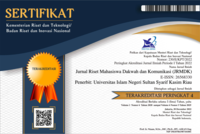ETIKA BERMEDIA SOSIAL: MORALITAS GEN-Z DI DESA DASAN GERES, KECAMATAN LABUHAN HAJI, LOMBOK TIMUR
Abstract
This study aims to understand the behavior and ethics of Generation Z (Gen Z) in Desa Dasan Geres, Labuhan Haji District, East Lombok, in using social media from the perspective of Islamic communication. Using a mixed-method approach and a case study design, the research examines how Islamic values are applied in Gen Z’s digital interactions. The sample was selected through purposive sampling, focusing on Gen Z individuals who are active social media users, particularly Facebook. The findings reveal that most respondents are aware of the importance of maintaining ethics on social media, with 89.7% of their communication displaying positive sentiments, while 10.3% show negative sentiments, often related to emotional or provocative topics. However, some respondents prioritize creating engaging content over considering its moral impact. Social pressure is identified as a key factor influencing their behavior, while the application of Islamic values in their digital interactions remains suboptimal. This study highlights the need for continuous education and guidance on social media ethics based on the principles of Islamic communication. The role of families, educators, and communities is crucial in helping Gen Z become wiser, more responsible, and ethical in their digital activities. Such efforts are expected to foster a healthier digital environment and promote positive interactions that contribute to improved social relationships.
Keywords
Full Text:
PDFReferences
Abdillah, F., & Handoko Putro, G. M. (2022). Digital Ethics: The Use of Social Media in Gen Z Glasses. Jurnal Komunikasi, 14(1), 158. https://doi.org/10.24912/jk.v14i1.13525
Apriani, A. A. (2016). Penerapan Etika Komunikasi di Media Sosial: Analisis Pada Grub WhatsApp Mahasiswa PPKn Tahun Mauk 2016 Fakultas Ilmu Sosial Universitas Negeri Padang. Of Civic Education, 3(3).
Asti, M. N., & Rizal, A. A. (2022). Lexicon Based Sentiment Analysis pada Trending Topic di Nusa Tenggara Barat. Jurnal Informatika dan Teknologi Komputer (J-ICOM), 3(2), 93-98.
Danuri, M. (2019). Perkembangan dan Transformasi Teknologi Digital. INFOKAM, 15(2), 120.
Fahrimal, Y. (2018). Netiquette: the ethics of millennial-generation social networks in social media. Jurnal Penelitian Pers Dan Komunikasi Pembangunan, 22(1), 69–78.
Fauziyyah, N. (2019). Communication Ethics of Digital Natives Students Through Online Communication Media to Educators: Eduvation Perspective. Jurnal Pedagogik, 06(02), 437–474. https://ejournal.unuja.ac.id/index.php/pedagogik
Fitrah Sugiarto, S., & Subki, M. (2021). Penafsiran QS. Al-Hujurat [49] Ayat 13 Tentang Kesetaraan Gender Dalam Al-Qur’an Menurut Quraish Shihab dan Sayyid Quthb. Al Furqan: Jurnal Ilmu Al Quran dan Tafsir, 4(1), 12-28.
Gani, A. (2020). Pengaruh Media Sosial Terhadap Perkembangan Anak Remaja. Mitra, 2(7), 64.
Magan, R. P., & Anggara, V. (2022). Etika Bermedia Sosial Bagi Generasi Z. Praxis: Jurnal Filsafat Terapan, 1(01).
Maura, T., Ramadhanti, S., Gika Kaban, A., Permata, D., Putri, S. M., Ramadhadi, M. R., & Harahap, N. (2024). Etika Komunikasi Dalam Bermedia Sosial Bagi Gen Z. Jurnal Ilmu Sosial Dan Humaniora, 2985(8), 252–259. http://jurnal.kolibi.org/index.php/kultura
Murdiyanto, E. (2020). Penelitian Kualitatif (Teori dan Aplikasi disertai contoh proposal).
Nia, L., & Loisa, R. (2019). Pengaruh Penggunaan New Media Terhadap Pemenuhan Kebutuhan (Studi Tentang Media Sosial Facebook Dalam Pemenuhan Informasi di Kalangan Ibu Rumah Tangga). Prologia, 3(2), 489-497.
Purwatiningsih, S. D., Inayah, R., & Gukguk, S. R. (2020). ETIKA KOMUNIKASI DALAM PENGGUNAAN MEDIA SOSIAL FACEBOOK SEBAGAI SARANA MEDIA INTERAKSI. IKON, 26(3), 240-261.
Rifani, E. (2021). Pentingnya Etika Komunikasi Dalam Menggunakan Media Sosial. December.
Subki, M., & Fitrah Sugiarto, S. (2021). Penafsiran QS. Al-Hujurat [49] Ayat 13 Tentang Kesetaraan Gender Dalam Al-Qur’an Menurut Quraish Shihab dan Sayyid Quthb. Al Furqan: Jurnal Ilmu Al Quran dan Tafsir, 4(1), 12-28.
DOI: http://dx.doi.org/10.24014/jrmdk.v6i3.33597
Refbacks
- There are currently no refbacks.
Editorial Office:
2nd Floor, Building of Da'wah and Communication Faculty, UIN Sultan Syarif Kasim Riau. Jl. HR Soebrantas Km 15, Simpangbaru, Tampan, Pekanbaru
Email : jrmdk@uin-suska.ac.id








.png)




